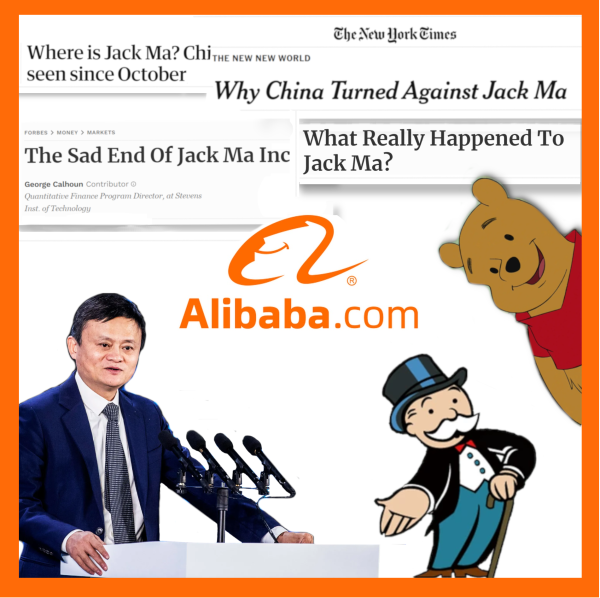
The Chinese Communist Party (CCP) cracked down on Alibaba and its former outspoken Chief Executive Officer (CEO) Jack Ma. Alibaba was hit with record fines from the CCP’s antitrust regulators and the company lost nearly 75% of its market value between 2020 and 2022.
Jack Ma questioned the CCP’s regulators, stating that Chinese banks suffered a “‘pawnshop mentality’ since the banks relied on “pledges and collateral” in their systems. Ma was not seen in public view for one year, and Alibaba eventually split into six smaller divisions, breaking up China’s largest private company at the time. Unlike the CCP, the United States federal government should allow outspoken CEOs; however, they shouldn’t tolerate growing monopoly power in America.
Monopolies are illegal in the U.S., and the federal government has been breaking them up since the implementation of The Sherman Antitrust Act of 1890: “a federal statute which prohibits activities that restrict interstate commerce and competition in the marketplace.”
The federal government must continue looking into America’s three most dominant companies today, as they did with American Telephone & Telegraph Corporation (AT&T). “In January 1982, in order to bring the nearly eight-year suit to an end, AT&T agreed to break up its local business into seven smaller regional operating companies known as ‘Baby Bells.’”
Amazon, Apple and Alphabet (Google’s parent company) are America’s largest modern monopolies. Microsoft, Meta and Nvidia are close but do not exercise monopoly power as the big three do. The market cap of these big three companies totals to over six trillion dollars, combining for a higher gross domestic product (GDP) than any country in the world, aside from the U.S. and China.
Although Americans enjoy products and services from the big three companies, monopolies are not healthy for the U.S. economy. The federal government and American people must consider the harms of these companies and the opportunities that would exist if they were broken up. Data shows that between 1998 to 2014, small businesses’ share of GDP fell from 48% to 43.5%. The U.S. economy is at its strongest when small businesses are thriving. Countless new ideas will never become small businesses, as Amazon, Apple and Alphabet have so much money and power that they can control who may join the “free market.” The Sherman Antitrust Act should be used to split each of the big three monopolies into many smaller less dominant companies.
Even the Federal Trade Commission (FTC) took notice of Amazon’s suspect techniques used against its competition — specifically its use of interlocking, anticompetitive strategies to maintain its power. On Sept. 26, 2023, the FTC along with 17 other state attorneys sued Amazon.com, Inc.
Starting a small retail-based store in your local neighborhood may be more difficult now than ever in U.S. history, considering this in terms of starting a mom-and-pop type store and not buying an already-franchised company. Small businesses are often unable to compete with Amazon’s prices and also lack start-up capital to get off the ground. Around two-thirds of U.S. small businesses face financial difficulties, with one-third of those stating this as the main factor for why they had to close.
The FTC believes Amazon “violates the law not because it is big, but because it engages in a course of exclusionary conduct that prevents current competitors from growing and new competitors from emerging.” Although Americans enjoy it when their Amazon Prime product swiftly shows up at their door for an affordable price, they must consider the harms of primarily shopping on Amazon. The ability to start new, retail-type businesses in your local community has been devastated by Amazon. Between 2007 and 2017, the number of small retail businesses dropped by 65,000, along with almost half of the apparel, toy and sporting goods makers going under.
Apple is also a monopoly. Although there are lower quality and cheaper competitors, many Americans don’t consider where Apple’s true monopoly power lies.
“The House Judiciary Subcommittee on antitrust’s groundbreaking report on Big Tech said Apple has ‘monopoly power’ over software distribution on iPhones, which allows it to generate large profits from the App Store and extract rents from developers.” When monopolies grow powerful enough, they can block any real new rivals and unfairly promote themselves. “The report found that Apple uses its control to exclude rivals and give its own apps and services a boost, including tweaking the search results for the App Store to promote its own apps, and using the App Store to boost competitors when it released competing products.”
Apple has such a monopoly in the App Store that it often pretends it will join different spaces which it has no intention of joining to avoid being considered a monopoly. “Apple is canceling its plans to build an electric car, according to multiple outlets, ending a secretive project.” Monopolies often claim they will enter an additional market to trick consumers and the federal government into thinking they are competing with more companies than they truly are. Apple can build an electric vehicle any time they want, considering their market cap and their access to the best engineers in the world.
Apple’s market capitalization in 2023 was over three trillion dollars — a larger GDP valuation than all but six of the world’s largest countries. Apple can simply buy or block any new competition that actually poses a threat to them within their space.
Alphabet is the final modern monopoly that the federal government should break up. The monopoly power comes from Google’s ability to control searches on the internet: “During the 10-week trial, the Justice Department used emails, slides and other records to illustrate how Google’s lavish payments to other companies ensured its search engine became the preselected option almost everywhere people access the internet.”
Alphabet often markets its additional products as Apple did with a potential electric car, but Alphabet’s monopoly power lies within search engines. Alphabet controls nearly 90% of online inquiries, allowing it to raise prices on advertisers with no resistance.
Starting a small business is a core value of the American dream. The American people must consider the beneficial results of breaking up past American monopolies. Unlike the CCP’s actions, this legislation must be based on economic realities. Consider the economic potential of multiple midsized companies after a monopoly is broken up. After AT&T was broken up, Americans had access to “more choices and lower prices for long-distance service and phones.” The Sherman Antitrust Act must be enforced before it is too late. If U.S. monopolies go unchecked, small businesses will suffer along with the U.S. spirit of entrepreneurship.










